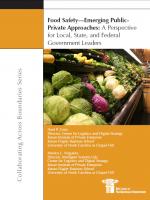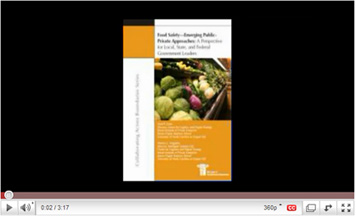
Food Safety—Emerging Public-Private Approaches: A Perspective for Local, State, and Federal Government Leaders
Submitted by rgordon on Mon, 08/02/2010 - 13:40

Using food safety as a case study, the authors discuss new approaches to public-private partnerships. This use of new approaches to public-private partnerships is applicable to all government organizations, not just food safety agencies. New approaches to public-private partnerships include the following:
- A new stakeholder model in which the private sector acts as a partner. In food safety, the private sector is acting as partner in both maintaining a safe food supply and responding to food contamination events.
- An increased emphasis on risk-based allocation strategies. In food safety, a risk-based resource allocation will reduce disease incidence and reduce economic burden on private sector companies that have good safety records.
- Increased use of technology and information systems. In food safety, new food traceability techniques which utilize private sector information promises to speed up the recall process, thereby reducing the scale and scope of food contamination.
- Increased use of co-regulation strategies. In food safety, co-regulation assumes a variety of forms including setting standards, enforcement, and monitoring.
This report describes the current responsibilities of key federal agencies now responsible for food safety in America, including the Food and Drug Administration, the Food Safety and Inspection Service, and the Centers for Disease Control. The report also describes legislation now pending before Congress, which would modify the current responsibilities for agencies now involved in food safety.




